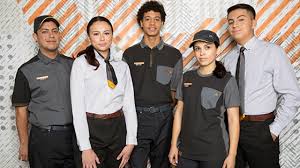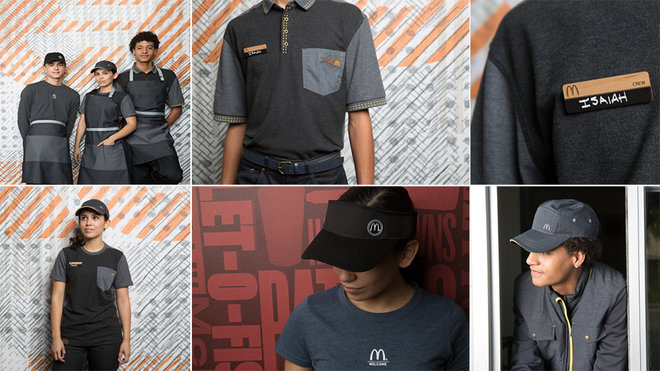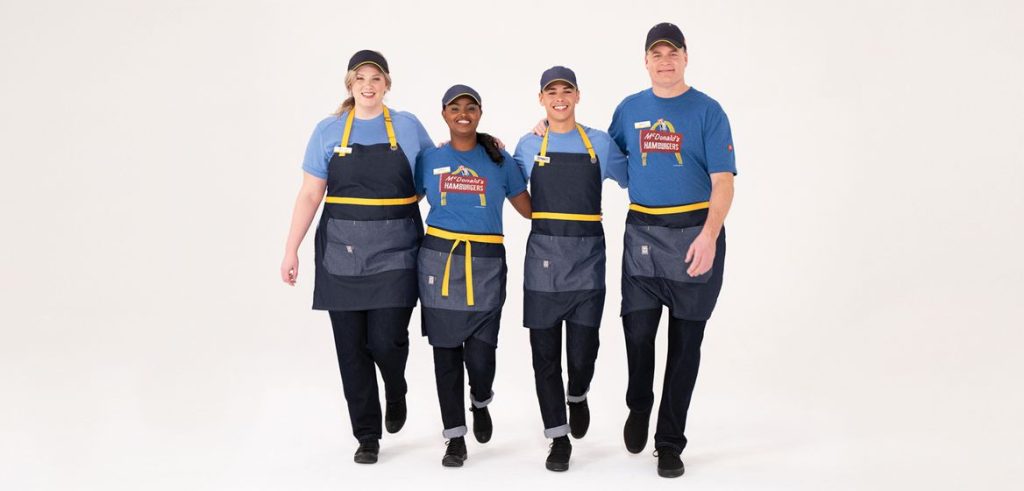New Uniform McDonalds: Fresh Style for a New Era!
Are You Curious To Know About The New Uniform McDonalds? The fast-food giant McDonald’s is stepping into a new era with its recently launched New Uniform McDonalds, showcasing a fresh and modern look for its crew members. These uniforms, including stylish aprons, jeans, and graphic T-shirts, are designed for comfort and professionalism and reflect a solid commitment to sustainability.
Made with innovative CiCLO® technology, the new attire allows polyester fibers to biodegrade at rates similar to natural materials like wool, significantly reducing the brand’s environmental footprint. As McDonald’s aims for net zero emissions by 2050, this initiative is a vital step in promoting eco-friendly practices while enhancing the working experience for employees.
Table of Contents
The Importance of Sustainability at McDonald’s

Sustainability is a core pillar of McDonald’s mission. The company is actively working to reduce its environmental impact, and transitioning to eco-friendly practices is crucial. McDonald’s has integrated renewable energy solutions in many locations. Rooftop solar panels are a great example. These panels help reduce carbon emissions significantly.
McDonald’s also focuses on waste reduction strategies. The brand is switching to more sustainable packaging options. This helps decrease the amount of plastic waste generated. Collaborating with suppliers, they aim to innovate continuously.
The new uniforms made with CiCLO® technology are part of this effort. This initiative showcases McDonald’s dedication to environmental stewardship. Reducing microplastic pollution is a priority for the brand, and the company’s actions are paving the way for a greener future.
The New Uniforms and Their Significance
| Aspect | Details |
| Upgrade Purpose | The new uniforms offer a stylish upgrade while emphasizing sustainability. |
| Sustainability Focus | Utilizing CiCLO® technology, McDonald’s addresses the issue of microplastic pollution through their uniform materials. |
| Uniform Components | The uniforms consist of aprons, jeans, and graphic T-shirts, catering to both comfort and functionality. |
| Design Influences | Modern design is informed by employee and customer feedback, ensuring practical use. |
| Color Scheme | The sleek grey and black color scheme presents a professional appearance for employees. |
| Environmental Goals | Transitioning to eco-friendly materials reflects McDonald’s commitment to achieving net zero emissions. |
| Employee Benefits | Employees can enjoy wearing uniforms that are both stylish and sustainable, enhancing their work experience. |
| Material Durability | The innovative materials used in the uniforms ensure durability without compromising environmental health. |
| Broader Mission | The new uniforms are part of McDonald’s larger mission to promote environmental responsibility and sustainability in its operations. |
| Positive Reception | The initiative has received a positive response from crew members, indicating its success in enhancing both style and sustainability. |
What Is CiCLO® Technology?

CiCLO® technology is a game-changer in textile innovation. It’s a patented ingredient used in polyester production. This technology enables polyester to biodegrade like natural fibers. Unlike traditional polyester, CiCLO® technology ensures fibers break down more quickly. Microbes and moisture activate the process, reducing microplastic pollution. This innovation addresses the longevity issue of synthetic fibers.
CiCLO® materials stay durable during their useful life. They only start biodegrading under specific conditions. You won’t see these fibers disintegrate on a shelf or during wear. CiCLO® technology offers a sustainable solution without compromising quality. It’s already being used in swimwear, bedding, and more. Now, McDonald’s uniforms also feature this groundbreaking technology. This advancement reflects a significant step toward eco-friendly practices.
The Environmental Impact of CiCLO® Technology
| Aspect | Details |
| Technology Overview | CiCLO® technology significantly reduces the environmental impact of synthetic fibers by enabling biodegradation. |
| Problem with Traditional Fibers | Traditional polyester can persist for centuries, leading to pollution in oceans and soils. |
| Biodegradation Rate | CiCLO® fibers biodegrade at rates similar to natural materials, lessening the environmental footprint. |
| Microplastic Pollution | This technology minimizes microplastic pollution, addressing a significant environmental issue. |
| Wastewater System Impact | Transitioning to CiCLO® reduces the clogging of wastewater systems by synthetic fibers. |
| Ecosystem Benefits | Reduction in microplastics contributes to cleaner marine habitats and healthier, more fertile soils. |
| Application in Products | CiCLO® technology is used in uniforms and various products, promoting healthier ecosystems. |
| Company Commitment | McDonald’s adoption of CiCLO® demonstrates a proactive approach to sustainability and environmental responsibility. |
| Global Impact | The environmental benefits of CiCLO® technology extend beyond the company, positively affecting communities worldwide. |
| Industry Standard | This innovative approach sets a new benchmark for sustainability within the textile industry. |
Collaborations and Partnerships

| Aspect | Details |
| Collaboration with Way To Be | Designed eco-friendly crew uniforms that align with sustainability goals. |
| Sustainable Packaging | Partnered with tms to create innovative packaging solutions that minimize waste. |
| Innovation in Waste Reduction | Collaborates with suppliers and franchisees to drive advancements in waste reduction initiatives. |
| Renewable Energy Projects | Engaged in projects like rooftop solar panels to enhance renewable energy usage. |
| Carbon Footprint Reduction | Initiatives emphasize McDonald’s commitment to reducing environmental impact and carbon emissions. |
| Continuous Innovation | Collaborative efforts lead to ongoing innovation in sustainability practices and solutions. |
| Industry Benchmark | Sets a standard for sustainability in the fast-food industry through effective partnerships. |
| Fostering a Sustainability Culture | Partnerships cultivate a brand culture focused on environmental responsibility and resource preservation. |
Field Testing and Crew Feedback

| Aspect | Details |
| Purpose of Field Testing | Evaluate new uniforms through blind field tests to gather unbiased feedback on performance. |
| Participants | Crew members wore CiCLO® technology uniforms during their shifts to assess comfort and care. |
| Comfort and Care | No significant differences reported in comfort or ease of care compared to previous uniforms. |
| Uniform Performance | New aprons, jeans, and T-shirts performed just as well as existing options, meeting employee needs. |
| Employee Feedback | Crew members appreciated the modern design, fit, durability, and practicality of the new uniforms. |
| Sustainability | Transition to sustainable materials did not compromise quality; uniforms contributed to environmental efforts. |
| Positive Responses | Feedback reaffirmed the decision to adopt CiCLO® technology, validating functionality and sustainability. |
| Continuous Improvement | The feedback loop established ensures ongoing enhancements in uniform design and functionality. |
| Nationwide Rollout | The testing phase was crucial for successfully implementing the new uniforms across all locations. |
Expanding Sustainable Practices Beyond Uniforms
| Aspect | Details |
| Waste Reduction | The company is actively committed to minimizing waste by transitioning to more sustainable packaging options and collaborating with suppliers for innovative solutions. |
| Circular Economy | McDonald’s focuses on advancing the circular economy by ensuring materials are reused and recycled, enhancing sustainability throughout its operations. |
| Franchisee Engagement | The brand encourages its franchisees to adopt sustainable practices, creating a unified approach to eco-friendly operations across all locations. |
| Impact on Environment | By implementing comprehensive eco-friendly strategies, McDonald’s is making a positive impact on the environment while benefiting communities around the globe. |
| Industry Leadership | McDonald’s proactive approach to sustainability sets a new benchmark in the fast-food industry, demonstrating its commitment to social responsibility and environmental stewardship. |
Future Goals and Net Zero Emissions by 2050

| Aspect | Details |
| Sustainability Commitment | McDonald’s is dedicated to achieving net zero emissions by 2050 through comprehensive changes across the business. |
| Renewable Energy | The use of renewable energy, including the installation of solar panels on rooftops, will play a significant role. |
| Innovative Packaging | Focus on developing innovative packaging solutions to significantly reduce plastic waste. |
| Collaborative Efforts | Partner collaborations will be essential to fostering a circular economy. |
| Support for Sustainability | Each initiative supports McDonald’s broader sustainability mission and goal to minimize environmental impact. |
| Continuous Innovation | Ongoing innovation will drive changes necessary to achieve sustainability targets. |
| Vision for the Future | McDonald’s envisions a future where sustainability is an integral part of its operations, contributing to a greener planet. |
| Commitment to Goals | Achieving net zero emissions is a challenging task, but McDonald’s remains steadfast in its commitment. |
| Path Forward | McDonald’s has a clear and promising path forward towards creating a more sustainable environment. |
Frequently Asked Questions
What makes the new McDonald’s uniforms sustainable?
The new uniforms are made with CiCLO® technology, allowing polyester fibers to biodegrade at rates comparable to natural materials. This reduces microplastic pollution and aligns with McDonald’s sustainability goals.
How do the new uniforms compare in terms of comfort and durability?
Field tests showed no significant differences in performance, comfort, or ease of care compared to traditional uniforms. Employees appreciated the modern design, fit, and the fact that they’re eco-friendly.
What is CiCLO® technology, and how does it work?
CiCLO® technology is a patented textile ingredient that enables polyester to biodegrade like natural fibers. It activates under prolonged exposure to moisture and microbes, ensuring the fibers break down more quickly without compromising durability.
How is McDonald’s expanding sustainability beyond uniforms?
McDonald’s is incorporating renewable energy solutions like rooftop solar panels and switching to more sustainable packaging options. These initiatives aim to reduce plastic waste and promote a circular economy, reflecting the brand’s commitment to environmental responsibility.
Conclusion
McDonald’s is pioneering a new era with eco-friendly uniforms. These stylish, comfortable outfits reflect a deep commitment to sustainability. With CiCLO® technology, McDonald’s is reducing microplastic pollution.
This innovation proves that practical and sustainable can go hand in hand. Furthermore, McDonald’s efforts extend beyond uniforms. They are exploring renewable energy and innovative packaging solutions. These actions are steps towards achieving net zero emissions by 2050. McDonald’s collaboration with partners fuels continuous innovation.
As a result, the brand sets a benchmark for environmental responsibility. The future looks promising as McDonald’s integrates sustainability into every aspect of its operations. Ultimately, McDonald’s aims to create a positive impact on the planet. The new uniforms are a symbol of this broader mission. Together, we can look forward to a greener future.




